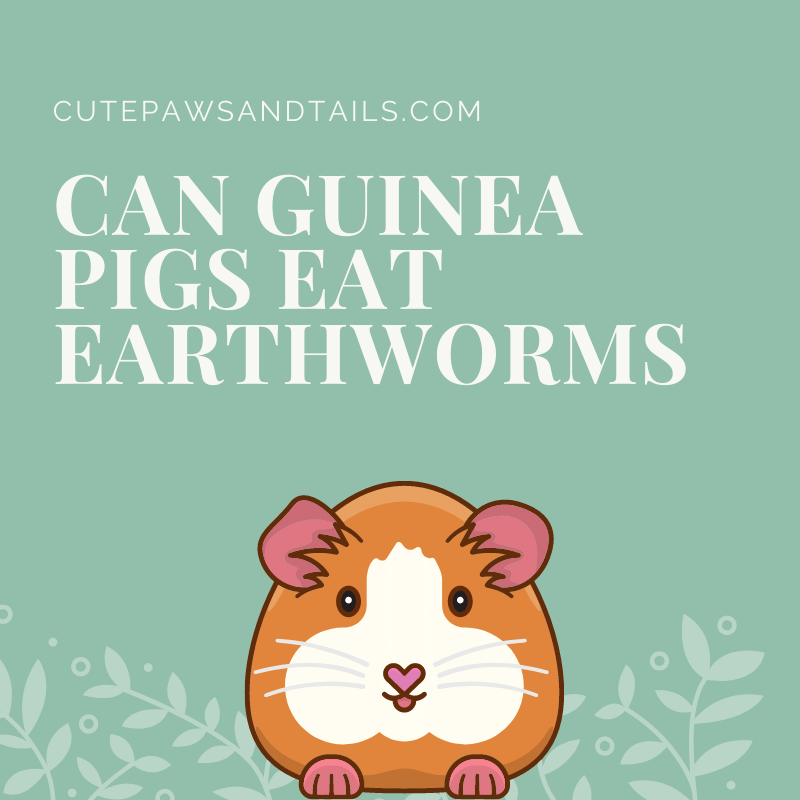Guinea pigs are emotionally sensitive animals that like being hold reassuringly as well as like great attention from their keepers. They are herbivores and part of their meals generally includes fresh fruits and leafy vegetables, however, their feeding gets challenging at times when you want to change their diets. For instance, can they eat earthworms?
Guinea pigs do not eat earthworms; instead, they may feed on mealworms. These are larvae from dark beetles. Many pets enjoy eating them for their high protein and fat levels; however, they have no nutritious contents for a guinea pig, so feeding them these, is of no help in their growth.
You do not have to struggle anymore about what to feed your guinea pigs. Read ahead for more info on what your guinea pig will enjoy most, as well as what would not be beneficial for their bodies.
What Foods Make Guinea Pigs Happy?
Guinea pigs are among the funniest pets, you can keep. It may be a good thing to feed them with something that will make them happy as well. However, the feeding nature of the guinea pigs can be quite difficult as compared to other pets that have direct meals.
In addition, their short lifespan is a call for feeding them healthy and balanced diets. However, the pigs may have challenges in digesting anything fed to them because of their sensitive digestive tracts. Therefore, they only feed on specific types of foods.
Their most essential foods are:
- Hay
This contributes to 80% of a guinea pig’s diet because of its importance in wearing down their constantly growing teeth. Hay is also rich in fibers that are necessary for maintaining the guinea pigs’ sensitive digestive tract.
Without hay in their daily meals, guinea pigs may develop several problems including the inability to eat because their teeth will have grown too long. So, their feeders need to be full of hay whenever they run out or at least twice a day.
- Fresh Fruits and Vegetables
The bodies of the guinea pigs do not have productions of vitamin C, so to help grow their bodies and avoid ill scurvy bodies they need to feed on high vitamin-rich foods. These include fresh lettuce, carrots, pepper, and vegetables that they should eat at least once a day.
You can also feed the young guinea pigs with pig pellets because they are rich in vitamin C. However, you may want to confirm the levels you feed them, because if they eat too much of this, they may fail to eat hay which is also of great importance in their bodies.
- You may also want to feed your guinea pigs with cucumbers. This also has Vitamin C in addition to their overall water composition. So whenever guinea pigs feed on cucumbers it helps in hydrating their bodies in the summer months.
Cucumbers are also rich in various minerals and other vitamins that may supplement their diet occasionally. However, the high water content present in cucumbers may cause the guinea pigs to have diarrhea if fed in high quantities. Nevertheless, there are no effects in failing to feed them with the cucumbers.
Can Guinea Pigs Eat Earthworms?
Guinea pigs cannot eat earthworms. Instead, they can eat live or dried mealworms. These are the larval form of the mealworm beetle a species of the darkling beetle; however, it is of no benefit to feeding the guinea pigs these mealworms because they have no nutritional help in their bodies.
The mealworms are, however, favorite meals for several pets after drying them by heating or freeze-drying. These mealworms though not real worms have fiber levels of 6%, moisture 5% fats 28%, and protein 53%. Although these are balanced diets for other pets, the guinea pigs need more fiber, vitamin C, and water; these have the least levels in the mealworms.
Do Guinea Pigs Need to Be Dewormed?
The grass Guinea pigs eat can expose them to worms, since some grasslands are used as paths by other animals, which soils them from time to time. So, at the moment of the grass collection, the feces might not be visible but the eggs present from the germs can still be in existence.
So, once such kind of hay is fed to the guinea pigs, they may be points of ingestion of worms in their bodies. Therefore, you must make sure that their hay and meals come from places where other pets may not have access. From the contaminated hay, the guinea pigs can get tapeworms or roundworms that may not show their presence after ingestion.
Therefore, Guinea pigs do not need regular de-worming unless they show symptoms of worms, in which case you should seek treatment immediately.
How Do I Know If a Guinea Pig has Worms?
In the early stages of worm infestation in their body, you are not likely to notice any signs or symptoms, but with time you may spot either of these:
- Loss of Appetite: – this is noticeable when your guinea pig is no longer enjoying foods it did before. You will most likely find a huge portion of uneaten food on their platters.
- Weight Loss: – This happens even when you are feeding the guinea pig some of the best nutritious foods. You may also notice the pet is consuming more portions but it is having no changes in its body.
- Rough and unkempt coat: – This happens mostly when your guinea pig spends more time finding food on its own from the grass in your backyard. However, rough and unkempt coats could be because of different factors other than worms, but it is always best to check with your veterinarian immediately you notice these.
- Watery droppings: – This can happen when guinea pigs eat too many water-based foods such as cucumbers; however, the presence of worms infestation in their bodies could lead to diarrhea, in form of watery droppings.
How Do You Treat Worms in Guinea Pigs?
Advisably it is best to let your veterinarian handle this. He/she may ask for a feces sample to help in determining the right drug to administer, however, the drugs may match the following depending on what their results match.
Nematodes:– these can be quite common in guinea pigs feeding in open lands. Their treatments vary from the injection of ivermectin or doramectin to administering benzimidazoles.
Cestodes: – these are hardly in guinea pigs; however, in case, they are present, they can be treated using praziquantel.
However, make sure you follow or buy drugs with a veterinarian’s prescription only.
https://www.omlet.us/guide/guinea/_pigs/guinea_pig_illnesses/parasite_checking/



